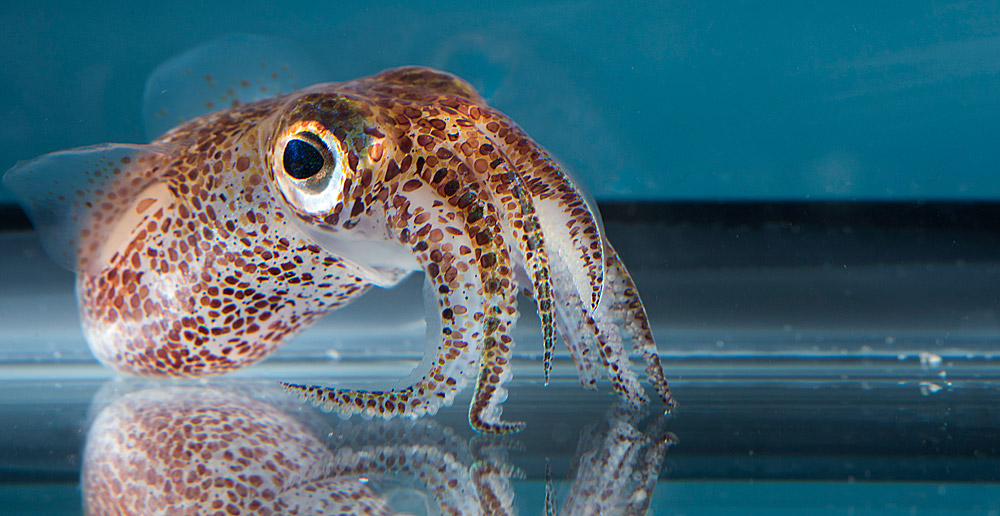Science
Related: About this forum'Mind-boggling' scrambled genome found in octopus and squid. It could explain their smarts.
Stephanie Pappas - Yesterday 9:49 AM
Squid, octopus and cuttlefish have scrambled-up genomes that may help explain how these cephalopods evolved the most complicated nervous systems of any invertebrate.
New genetic sequencing reveals that these animals' genes are mixed up, arranged in strange orders not seen in other, non-cephalopod species. This DNA mixing and matching may have given evolution a new sandbox to play in, study co-author Caroline Albertin, a biologist at the University of Chicago Marine Biological Laboratory, told Live Science.
"A hypothesis is that these new gene arrangements resulted in new expression patterns and that means these genes could be used in a new place or in a new way," Albertin said, referring to the process of a gene being "expressed" or activated to create proteins that do some type of work in the body.
Those new opportunities, in turn, could explain some of squid and octopuses' incredible abilities, such as advanced vision or arms that have their own "brains."
More:
https://www.msn.com/en-us/news/technology/mind-boggling-scrambled-genome-found-in-octopus-and-squid-it-could-explain-their-smarts/ar-AAX7j0v
Hekate
(94,881 posts)Duppers
(28,248 posts)My husband & myself. I don't understand how anyone can eat intelligent critters like these.
Shrimp, yes. But I confess I have a problem eating most critters.
🚨Hidden World of Octopus Cities Shows We Must Leave These Sentient Creatures Alone
https://www.sciencealert.com/is-octopus-farming-ethical-a-scientist-makes-the-case-to-leave-them-alone
Lobsters and crabs are sentient beings and shouldn't be boiled alive, UK report says - CNN
https://www.cnn.com/2021/11/22/europe/uk-sentient-beings-crabs-octopus-and-lobsters-scn/index.html
AND from one of Judi Lynn's threads ![]() last year...
last year...
https://www.democraticunderground.com/122879054
Judi Lynn
(162,437 posts)
A Hawaiian bobtail squid (Euprymna scolopes)
TOM KLEINDINST
In two related studies, researchers describe huge chromosomal rearrangements and about 500 novel gene clusters in the octopus, squid, and cuttlefish genomes, which they say could help explain how they evolved their extraordinary brains.
Sophie Fessl
May 13, 2022
Octopuses, squids, and cuttlefish—together referred to as the coleoid, or soft-bodied, cephalopods—are astonishingly clever, dextrous, and ingenious. They problem solve, plan for the future, and have the largest nervous systems among invertebrates. Now, two recent studies with some shared coauthors that were published in Nature Communications on April 21 and May 4, uncover chromosomal restructuring that may explain how the novelties of this curious group evolved.
Gül Dölen, a neuroscientist at Johns Hopkins University who was not involved in either study, says the studies will help scientists understand how genes, synapses, and circuits produce complex behaviors. “As a neurobiologist interested in understanding brain evolution, I think this is a major step forward.”
Cephalopod genomes reveal large gene rearrangements
In 2015, some of the authors behind the new studies sequenced the first cephalopod genome, that of the California two-spot octopus (Octopus bimaculoides). At that time, the researchers noticed that the animal’s genes appeared to be arranged differently from those of other animals. Usually, “genes stay on the same chromosome,” says Oleg Simakov, a developmental biologist at the University of Vienna in Austria and co-author of the 2015 study as well as both newly published studies. In the California two-spot octopus, though, many genes weren’t in their expected places.
However, the evolutionary significance of this reordering wasn’t clear, and became the subject of the newly published studies. “We wanted to ask: Is there any function?” Simakov recalls. Also, the researchers wanted to make sure that the apparent rearrangement wasn’t an artifact of the methods they used to assemble the genome years earlier. To answer these questions, the researchers needed more detail—specifically, the chromosomal arrangement. “If you don’t have chromosomes, you only have pieces of the genome,” says Hannah Schmidbaur, a former graduate student of Simakov and co-author of the new studies.
More:
https://www.the-scientist.com/news-opinion/reshuffled-genomes-may-explain-cephalopods-smarts-70015